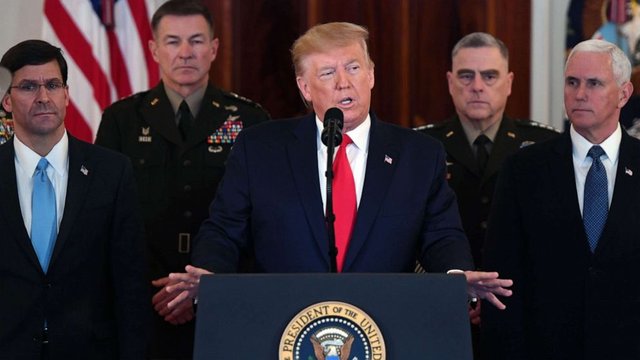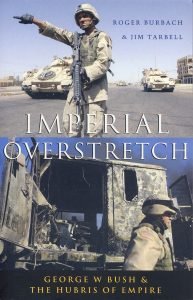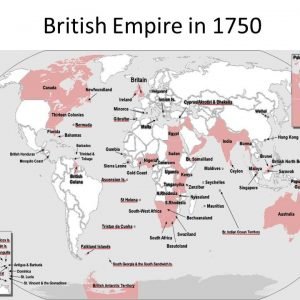Donald Trump, Iran and the Howl of a Dying Empire?

Whether the United States is a declining power has been a subject of a long debate since the mid 1980s. It could be said that the intervention of the late Prof Susan Strange in that debate is part of her mystique in the discipline of International Political Economy till today, many years after her death. The debate has since come back after the invasion of Iraq, especially with the publication of Imperial Overstretch. Where the metaphor was taken from Paul Kennedy’s classic on how great powers end disastrously. In the piece below, Simon Jenkins, British writer tries to look at current US foreign policy antics in terms of the framework. The piece, originally published in The Guardian, (https://www.theguardian.com/commentisfree/2020/jan/09/donald-trump-rant-iran-dying-empire-nato) as “Donald Trump’s rant against Iran is the howl of a dying empire” has been edited to Donald Trump, Iran and the Howl of a Dying Empire?

The author
As the president slurred ritualised abuse of Iran and pleas to Nato, we saw the US’s days as world hegemon dribbling away
Donald Trump does not strut the world stage as Augustus triumphant. On Wednesday he might have commanded that “Iran will never be allowed to have a nuclear weapon … we will never let that happen”. But as he slurred at his autocue, he conveyed only ritualised abuse of Iran and pleas to Nato for help, a Nato he once majestically derided. I sensed we were seeing the US’s days as world hegemon dribbling away. Even Trump’s Republican ally Mike Lee called the Iran briefing “the worst briefing I’ve seen – at least on a military issue – in my nine years” in the Senate.
All empires outstay their declared purpose, let alone their welcome. All end messily – the operative word is all – be they Roman, Napoleonic, British or Soviet. All are vanquished not by superior power, but by self-delusion and geography. The British empire had neither the right nor the need to invade far-flung parts of Asia and Africa. It was defeated by them. The US has claimed the right to intervene in theatres as diverse as South America, the far east, east Africa and a portfolio of Muslim states. Justification varies from retaliation and deterrence to “self-defence” and the instilling of democracy.
A key textbook in contemporary IRs
The US’s intentions have often been noble, but good intentions camouflage power projection. When your drones can kill anyone anywhere, the temptation is insuperable. If you think you can police the world from a bunker in Nevada, why not try?
Trump’s instinct was once that of a classic American isolationist. As he reiterated to Congress last February, “Great nations do not fight endless wars … the hour has come to at least try for peace.” He was announcing withdrawal from Syria and more tentatively from Afghanistan. Yet he is still there. The US is fighting six wars – also in Iraq, Yemen, Somalia and Libya. None has any conceivable relevance to its own security.
Imperialism sticks to politics like glue. Even as common sense screams withdrawal, staying offers the populist an opportunity for glory. It was thus that British ministers in the 1950s and 60s fought to hold on to Aden, Kenya and Cyprus. Today Boris Johnson craves the machismo of a totally pointless carrier force in the far east. Some imperial ghost seems to sneak down from the India Office attic to stalk Downing Street at night.
Twenty years of western interventions in the Muslim world have rested on two falsehoods. One is that terrorism poses an existential threat to western democracies, grotesquely underrating their inherent stability. The other is that intervention can remedy such a threat, can enforce obedience and even democracy on victim states. I remember watching rightwing US thinktankers trying to administer Iraq from Baghdad’s Green Zone in the months after the 2003 invasion. By what right?
Alien intervention in the internal affairs of sovereign states is immoral, specifically banned under chapter one of the UN charter. That ban was supposedly overridden by Tony Blair’s much-cited “responsibility to protect” civilian populations. But as the casualties mounted, protection became mere cover for ceaseless wars of western aggression. That is why the UN is all but absent from these interventions. As George Bush said, “I leave the UN to lawyers.”
The issue now is not whether we can any longer plant the flowers of democracy in fields we have drenched in blood. It is how to get the hell out. The sight of Trump ranting against Iran and inflicting on it yet further sanctions was like the final scene of a tragic opera. He seemed a man trapped.

Two American presidents played a significant role in the demise of British imperialism. Franklin D Roosevelt told Winston Churchill that the US’s involvement in the second world war was strictly on condition that Britain dissolved its empire. The US would not defend it. John Foster Dulles, who was later US secretary of state, said in 1945 that his was “the first colony to have won independence” from Britain, and it expected others to follow. This advice was fiercely echoed in 1956 by Dwight D Eisenhower, appalled at Britain’s invasion of Suez.
Iraqi politicians this week joined the anti-imperial cause by demanding that American forces be withdrawn from their soil. All Trump could do was refuse, despite having previously pledged to do just that. Even in its hour of insecurity, 17 years of American occupation had left Iraq just desperate for it to end. It knows it must live at peace with its powerful neighbor, Iran, and this requires it to be no longer to be a tool of American presidential machismo. Likewise Afghanistan must find its own accommodation with the Taliban and with its neighbor, Pakistan.
As for Britain, its 20-year creep under Washington’s coat-tails, by Blair, David Cameron and now Boris Johnson, is humiliating and expensive. It should be offering the advice of an old and honest friend, whose history has so paralleled the US’s predicament. Instead, it offers only the cringe of a lackey awaiting a reward, in this case an implausible post-Brexit trade deal.
As empires crumble, stuff happens. It could yet be that Trump’s killing of Qassem Suleimani jolts every participant in this game to realise that it is just not working. The US president is a man of emotional and unpredictable responses. He could indeed pull out of Iraq, leaving it to separate from Kurdistan and do a deal with Tehran. He could leave Syria to its fate, and leave Afghanistan to the tender mercies of Islamabad. As for Britain, at last it could have nothing whatsoever to do with this mess.
- Simon Jenkins is a Guardian columnist
Posted from my blog with SteemPress : https://intervention.ng/18683/